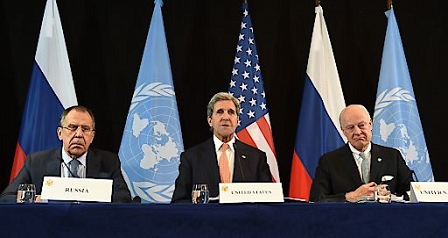Erstellt am: 12. 2. 2016 - 14:01 Uhr
Syria: A cessation of hostilities
FM4 Reality Check
Listen to the programme in the FM4 Player or subscribe to the podcast and get the whole programme after the show
Speaking in Munich, Germany, Russian Foreign Minister Sergey Lavrov and US Secretary of State John Kerry announced Thursday an agreement to temporarily end hostilities in Syria.
The agreement, which will be implemented in about a week’s time,does not signal the end of the civil war or apply to terrorist groups such as ISIS or al-Nusra and Kerry also stressed that the ceasefire in no way solidifies Bashar al-Assad’s future as Syria’s head of state.
What the agreement does mean though, is that the delivery of desperately needed humanitarian aid can be sped up.

AFP / Christof STACHE
Riem Higazi spoke to Kristin Helberg, journalist, author and Syria expert.
Riem Higazi: Who exactly was a party to this agreement?
Kristin Helberg: In Munich we had everybody sitting at the table who is involved in Syria except the Syrians themselves – meaning the Syria regime, and the opposition.
So Saudi Arabia, Iran – they were there with their foreign ministers, Turkey, Qatar, whoever is involved there from the region was there.
Okay, we’ve got the “who” but let’s address the “what” – what did they agree to exactly?
They agreed that there should be a ceasefire within one week, everybody should influence their actors on the ground, meaning the Assad regime and different rebel groups, so that they would apply this.
And, very important: they decided that humanitarian aid should be delivered immediately to all the besieged areas inside Syria. And they named the very villages and areas and cities that are being besieged – the majority of them by the Assad regime, some of them by rebel groups or by ISIS.
This is interesting because until now the UN was not able to deliver aid because they didn’t get the permission from the Assad regime, so this means that we need now pressure on Assad to allow these humanitarian convoys, and if they are not allowed through they should try to drop it by air.
The big problem is that it all depends again and again on the good will of the different parties. We have seen six UN resolutions, we have seen agreements in Vienna, that basically said the same thing – that you should stop bombing civilians, that you should help people who are being besieged, humanitarian convoys, this has all been written many, many times and it was just not being implemented, so I am very doubtful, very sceptical.
So how can a ceasefire like this be implemented? What is the next step?
The very important point is the definition of terror inside Syria because the paper says that the bombarding of, for example Islamic State is still allowed and it’s still allowed to bomb the Nusra Front, which is the official arm of Al Qaeda inside Syria.
The problem with the Nusra Front is that it is in several areas alongside other rebel groups. Sometimes you have one village being controlled by the Nusra Front whereas the city next door is being controlled by moderate rebels, so this is very complicated.
(The parties at the meeting) decided that they will have a task force that should define the areas where ISIS is and where the Nusra Front is.
This for me somehow opens the door for Assad and the Russians to just keep on bombing in provinces like Idlib and Aleppo and the southern province of Daraa where you have some Nusra presence but you have basically other rebel groups that are important and in charge there, and part of the political process and should therefore not be bombed.



